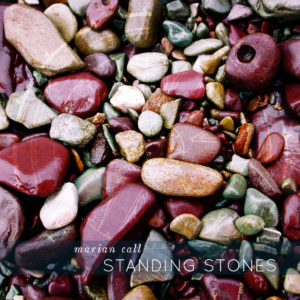Cycles Inside Cycles, Messages Inside Messages
We at Fleen have been known to wrestle with what a webcomic actually is, and going on twelve years in the blogging game, hell if we know. It’s basically whatever feels like it fits the definition; if you can imagine related stuff being sold by TopatoCo, it’s probably webcomicky.
Which is why we’re engaging in a first today, and taking a deep dive into something nonvisual.
Standing Stones is the tenth album by internet musician Marian Call, now on tour (including a show in a week’s time adjacent to next week’s San Diego Comic Con). It’s been a long time in development, some two years, and it turned out to be rather more than an album. She describes it as a song cycle, which is not a term that you can use casually. It’s appropriate, though: there’s not just a theme to the album, but meaning in how the songs interact with one another; the order is particularly important, and it’s probably the best trace the stages of life collection since XTC’s Skylarking.
Call drops multiple references to The Twelve Ages Of Man and each song evokes an age, starting with a musing on both birth and death (Bones), continuing through the wild creativity of childhood (Paper), the realization that we’re not as fantastic as we thought (Oregon Trail), the desire to leave our mark on the world (Standing Stones), the reality of loss (Hope), the cynicism of modern life (Like This), the compromises that we fight against (Mediocre Algorithmic First Date), the need for community (Independence), the acceptance of pains and struggle (Vespers), our struggles with ourselves (The Devil), and a reflection on endings and the infinite (Grandpa Had It Right).
But here’s the thing — within that linear ordering, there are at other patterns. Through much of the album, there’s an alternating quick/slow tempo to the songs, moving quickly and then relaxing, like a heartbeat¹. Adjacent songs act as reflections of each other (Paper v Orgeon Trail looking at dreams; Standing Stones v Hope on what we build and lose; Like This v MAFD on how we present ourselves and who we really are). And Taking the Twelve Ages as reflecting both the progress of a life and seasons of the year, there’s a little cycle in each cluster of songs — dreams, building, relationships, sunsetting, each following a similar cycle.
As you noticed, there are only eleven tracks to go with the twelve ages, but Call’s got you covered there. Grandpa Had It Right reminds us that we’re only bones with stories on and carries us back to the start. Those bones show up throughout the cycle, and they’re an apt framework to hang the songs on. Another writer might have tried to get to the heart of who we are², but Call seeks to get to the bones of it; she knows that hearts break and fail, but bones persist. Long after our hearts are gone, our bones and the stories we grow on them will still be there.
I haven’t mentioned the music yet, or Call’s vocal performance, and it’s not because they’re lacking. I know words; I get them, I can pick them apart, find the meaning and truth (or at least a meaning and truth) in stories. My brain doesn’t pick apart music the same way; I can tell a good performance from a bad one (or more precisely, one that accomplishes what it sets out to do from one that doesn’t), but I can’t tell you about the importance of how this instrument plays against that, or how the scales line up. Hell, I’m practically beat-deaf.
But I can tell you that there’s a lot of richness to the playing, blending into an integrated whole that never overwhelms the most important instrument — Call’s voice. There’s discussion in these songs, as she talks to others we cannot hear (and sometimes, to herself). The emotional heft — from wistfulness to optimism, determination to acceptance — has a depth and breadth, drilling into the feeling part of your brain and not letting go. You won’t catch it all on a single listen, or even two. You’ll need to listen to think, and again to feel, and again to bring them all together.
And, if you’re like me, a half-dozen more times in short succession just because it all helps you make sense of the world when it’s not making a lot of sense on its own.
Standing Stones is available for download in a variety of formats, and as a CD. Marian Call is on tour through November; if you don’t see your city listed, email her.
Spam of the day:
Search Cell Phones For SENIOR CITIZENS
Ain’t that old yet. Get lost.
_______________
¹ Is it my imagination that the strength of that heartbeat is greater at the beginning of the album than at the end?
² Or, in one writer’s equally valid argument, the liver.

The above comments are owned by whoever posted them. The staff of Fleen are not responsible for them in any way.